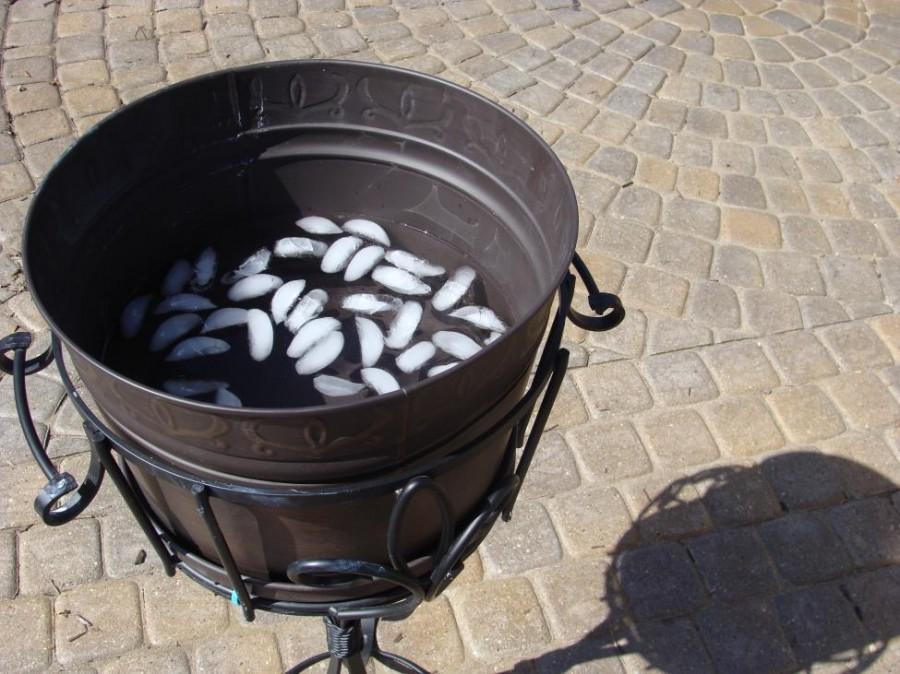ALS Ice Bucket Challenge: What are you supporting?
Social media sites are swamped with videos labeled as the ALS Ice Bucket Challenge. This challenge has become a popular fad among teens and adults alike. Though many find the challenge beneficial, it is apparent that the challenge raises more issues than it resolves.
The disease ALS, or amyotrophic lateral sclerosis, is a neurodegenerative disease that causes damaged nerves in the brain and spinal cord, which eventually leads to death for most patients. Many research facilities have put extensive time and research into finding a cure and assisting victims of ALS.
Although many believe the ALS Ice Bucket Challenge has raised awareness of the disease, they remain unaware of its detrimental effects. Although some are satisfied with the media attention, many wish the community would not only know the term ALS, but what it refers to as well.
“I don’t feel that the challenge relays the message,” said art teacher Mr. Aaron Poris. “The message becomes lost and… more about entertainment.”
The majority of participants are nominated to complete the challenge of dousing one’s self with ice water or donating money to ALS research. The organization profiting the most from this challenge is the Amyotrophic Lateral Sclerosis Association (ALSA). This choice raises some questions: why choose between donation and participation when you can contribute both? The majority of people drenching themselves with ice water are participating for the sake of social media attention.
“I think that everyone should donate money rather than completing a challenge that benefits social media and one’s peer image,” said senior Grace Carmona.
Many have become concerned with the waste of valuable drinking water for the sake of the challenge. Students at Shadow Hills High School in Indio, California however, used recycled pool water to hydrate their drought-ridden grass during the ice bucket challenge.
Governmental concern over this ethical violation caused U.S. diplomats, House members, and military personnel to be banned from partaking in the Ice Bucket Challenge. Lawyers at the State Department refuse to allow public office for private gain, “no matter how worthy the cause,” according to The Huffington Post.
There has also been controversy about the validity of the ALSA. This concern comes from the community and especially the Catholic Church. ALSA uses a portion of their donations to fund embryonic stem cell research. The termination of an embryo, even to aid in research, violates Catholic teachings. Certain dioceses, such as the Diocese of Cincinnati, Ohio, have banned participation and donation to ALSA.
“If your school is planning an effort to raise funds, you should immediately cease such planning, or direct your fundraising to another organization with a similar goal, but whose practices are consistent with the Church,” said Jim Rigg, superintendent of schools in the archdiocese of Cincinnati, according to WCPO Cincinnati.
Several dioceses suggest donating to various associations that do not support embryonic stem cell research, such as John Paul II Medical Research Institute (JP2MRI) in Iowa City, Iowa. This institute is pro-life supportive by testing adult stem cells instead of embryonic stem cells. Their mission is to “[focus] on the most ethical and cost-effective way of conducting medical research to help develop therapies and cures for a variety of diseases.”
“We support efforts that are in line with our principles as Catholics to end that devastating medical condition,” said Rigg. “We have to ensure that all of our efforts are reflective of our principles, including the belief in the sanctity of life. The John Paul II Medical Research Institute reflects these principles.”
Additionally, ALSA spends a mere 28% percent of donations on research, while the JP2MRI uses roughly 55% of donations for research. The money not spent on research goes toward the community, education, fundraising, and administration.
“If [ALSA] actually used the money towards research we could be that much closer to the cure,” said Mercy senior Phoenix Dempster.

